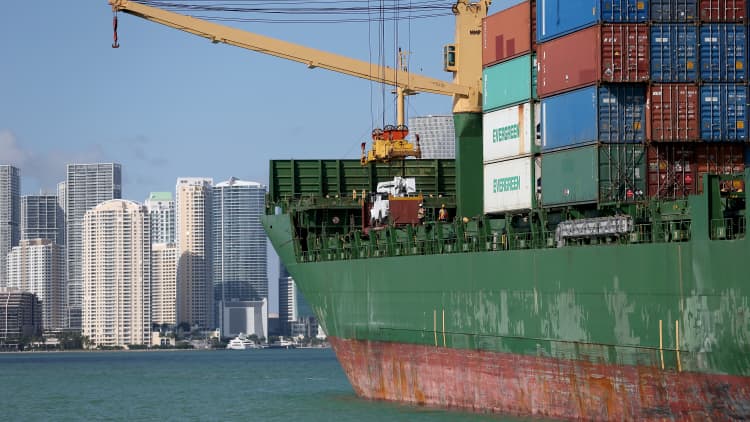
A Republican proposal that would tax retailers on goods they import and sell in the U.S. still has more questions than answers.
But that hasn't stopped industry leaders and trade groups from increasing the pressure they're putting on Washington, D.C., as they fight against a policy critics say could put some of these companies out of business.
A "large number of CEOs" have been to D.C. in recent months, to share their concerns about a so-called border adjustment tax, David French, senior vice president for government relations at the National Retail Federation, told CNBC.
When factoring in visits from CFOs, those numbers are "easily" in the double digits, French said.
Separately, the Retail Industry Leaders Association (RILA) on Wednesday formally launched a national campaign to fight the border tax, called Americans for Affordable Products.
A vice president for that trade group recently told Jefferies that participants across the industry have reached out about the issue, "including retailers who typically do not engage in public policy issues," Jefferies analyst Randal Konik said.
RILA's members include major retailers like Target, Home Depot, J.C. Penney, Wal-Mart and Nike. Of those retailers, only Target and Home Depot responded to CNBC's request for comment. A Home Depot spokesman said the company is "still studying the possible scenarios and impacts."
A Target spokeswoman echoed that statement, saying the retailer is "closely monitoring the ongoing discussions on tax reform and the impact of the House's proposed border adjustability tax on our guests." The spokeswoman confirmed to CNBC that Target CEO Brian Cornell was one of the industry executives who went to Washington to speak out about the tax, as was first reported by Politico.
"We can confirm that [CEO Brian Cornell] traveled to D.C. to participate in conversations with lawmakers but we are not going to get into specifics of those conversations," Target spokeswoman Dustee Tucker Jenkins said.
However, a source close to the matter told CNBC that Target's message is centered on the impact a border tax would have on its shoppers, who would end up paying more for the company's products. The retailer is also emphasizing the fact that 99 percent of its workforce is based in the U.S., and that a border tax would slow its plans to open small, urban stores that would employ more Americans.
"In the last decade, no issue has galvanized the industry more than this one," Brian Dodge, senior executive vice president of public affairs at RILA, told CNBC.

Details regarding a potential border tax are largely a question mark, though a 20 percent adjustment has been most frequently discussed. The White House has floated the idea of using an import tax as a way to pay for the wall President Donald Trump wants built between the U.S. and Mexico.
Yet while some argue that such a tax would increase the value of the dollar, and therefore lower the cost of imports, analysts maintain that most apparel and footwear brands would be forced to raise prices for consumers.
"Any border tax will of course lead to higher prices for the consumer. That's just the reality that we'll have to face if it comes to that," Coach CEO Victor Luis told CNBC's "Closing Bell" on Tuesday.
Companies with less pricing power than a luxury handbag maker would be in an even tougher spot, as they'd have a difficult time persuading consumers to spend more on their products. Even if they did raise prices, some retailers could see their profitability cut by 70 percent, according to an analysis by Cowen & Company.
"It's going to accelerate the losers," Greg Petro, president and CEO of First Insight, told CNBC. His firm helps retailers select the right price for their products to maximize profitability.
Cowen's analysts said relative winners in a border adjustment scenario are multinational retailers with a significant chunk of international revenue (think Nike or Fossil). On the flip side, companies that import goods and generate 100 percent of their sales domestically, like Target, will struggle. So will specialty shops like Gap, American Eagle and Urban Outfitters, Cowen said.
As the retail industry continues to lobby against the tax, Pressure is also heating up on the other side of the aisle. The Alliance for Competitive Taxation, whose members include IBM and MasterCard, said in a statement last week said that it supports the House Republican tax reform blueprint. That blueprint includes a border adjustment tax.
A source close to the matter told CNBC last week that Wal-Mart and Nike exited that alliance because they would not support a border tax. Representatives for ACT, Nike and Wal-Mart did not return CNBC's requests for comment.
"These coalitions are starting to fray around the edges because the House blueprint... creates such diverse winners and losers," NRF's French said. "If you're on the winners side you're like, 'Rah rah, this is great.' If you're on the losers' side, this could put you out of business."



